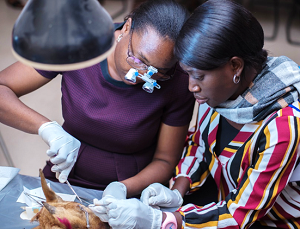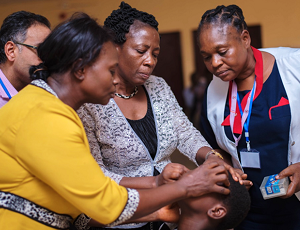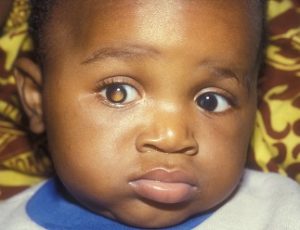Rb-NET – SAVING LIVES – SAVING SIGHT – SAVING FAMILIES
Visit the Rb-NET website: https://www.rb-net-mdt.org/
THE CHALLENGE
Retinoblastoma (Rb) is the commonest and most devastating eye cancer that affects children worldwide. There are 8,000 new cases every year and if diagnosis is delayed or treatment is not available the child will die. In high-income countries, with specialised Rb centres, almost all children will survive and most eyes are preserved. This transition from fatal to curable disease has not been realised in low- and middle-income countries (LMICs), particularly in Africa, where mortality is typically around 70%, with devastating consequences for the children and their families.
THE SOLUTION
The Rb Network (Rb-NET) was established in 2017 with the aim of improving retinoblastoma outcomes in LMICs, enabling more children to survive and see. It is formed of 10 Rb treatment centres in 6 Sub-Saharan African countries (Tanzania, Uganda, Malawi, Kenya, Nigeria and Zimbabwe), who are linked with experts from 5 specialist Rb centres in the UK, India and Israel.
The network trains multi-disciplinary teams who work together to develop and deliver integrated Rb care. The Rb-NET focus areas are:
- Planning and developing Rb services
- Early detection in the community and urgent referral to treatment centres – establishing national referral pathways
- Training on treatment, including laser and chemotherapy
- Coordinating and conducting multicentre epidemiological and operational research
ACHIEVEMENTS
Three Rb Planning Workshops have been conducted bringing together Rb stakeholders to agree a plan of action for establishing Rb national referral pathways and exchange knowledge on Rb management.
Twelve exchange visits have taken place, delivering training in diagnosis and management of retinoblastoma.
Two key studies have been coordinated through the Rb-NET:
The Global Retinoblastoma Presentation 2017 study reviewed 4,351 Rb cases in 153 countries to understand the global picture of the effect of delayed diagnosis.
The Red Reflex Trial investigates African-specific solutions for the early identification of children with retinoblastoma, to improve their chance of survival.



